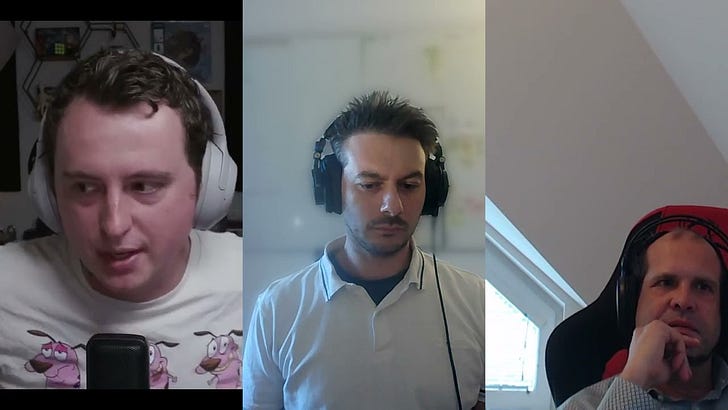Content Warnings:
Contains explicit discussions of venture capital excess, algorithmic consciousness commodification, toilet-based startup ideation, and sustained exposure to Silicon Valley's most potent mythological constructions.
May induce acute awareness of privacy policy surveillance infrastructure and chronic skepticism toward "AI-native" positioning strategies.
Transmission Length: 61 minutes of digital séance archaeology
Release Frequency: Weekly descents into the algorithmic unconscious Format: Cybernetic confessional with guest prophets from the data mining underground
Subscribe to receive weekly transmissions from the intersection of silicon dreams and venture capital nightmares. Each episode a digital excavation, each conversation a communion with the ghosts haunting our technological present.
"In the cathedral of code and capital, we catalog the artifacts of our own digital demise."
Watch the full video here:
Let me tell you about Jeremy—a guy who turned his own AI tool anxiety into a million-dollar business idea. While everyone else was drowning in decision fatigue from endless AI launches, Jeremy said "screw it" and built the solution we all needed: WhatIsThatAI.
This isn't your typical founder story. Jeremy started as an affiliate marketer ten years ago, pivoted through multiple ideas, and finally found his goldmine in the most unexpected place—cataloging the chaos of the AI boom. He's built automated systems that screenshot websites, parse privacy policies, and track pricing changes across thousands of tools. Sounds boring? It's anything but.
What You'll Learn:
How to spot real opportunities hiding in plain sight (hint: it's usually solving your own problem)
The technical reality behind "AI-native" marketing speak (spoiler: most of it's bullsh*t)
Why the current AI economy is essentially venture capital theater
How to build sustainable businesses during tech hype cycles
The psychology of night-shift productivity and unconventional work schedules
Real Talk Moments: Jeremy breaks down why GPT-5 disappointed him for coding, how he accidentally created viral content by copying others, and why he thinks we're headed for a rough 10-year transition period. Plus, we somehow end up discussing AI-powered toilets as the next billion-dollar idea (don't laugh—stranger things have gotten funded).
The Contrarian Take: While everyone's chasing the latest AI model, Jeremy's making money by organizing the mess. His approach? Let the VCs burn cash on fancy algorithms while you build the infrastructure that actually helps people make decisions. It's unsexy, profitable, and sustainable.
This conversation hits different because Jeremy's living it in real-time—building during the bubble, not after it pops.
Key Takeaways for Founders:
The Opportunity Recognition Framework:
Personal pain points often signal market opportunities
Sometimes the best business is organizing existing chaos, not creating new solutions
Network effects compound when you solve information problems
Technical Reality Check:
Most "revolutionary" AI companies are just knowledge graphs with better marketing
Screenshot analysis can bypass anti-scraping tech (legal gray area, but effective)
Version control for privacy policies creates unexpected competitive moats
Energy costs will eventually force AI pricing reality
Founder Psychology:
Night owls might have productivity advantages in global markets
Insomnia and active minds often drive entrepreneurial thinking
Geographic arbitrage still works (European copycats crushing US ideas)
Sometimes copying what works is smarter than pure innovation
Market Timing Insights:
We're in the "subsidized by VC" phase of AI economics
The current model isn't sustainable, but opportunities exist in the transition
Government adoption of AI tools creates new compliance markets
Integration mapping becomes valuable as the tool ecosystem explodes
Personal Stories That Hit:
Jeremy's Affiliate Marketing Origins: Started with simple traffic generation, learned to identify patterns in user behavior, developed skills in data analysis and conversion optimization—all before AI was mainstream.
The Nocturnal Productivity Discovery: Jeremy's natural night schedule actually gives him advantages in a global business. While his competitors sleep, he's processing data and building systems.
The Privacy Policy Insight: Realized that nobody's actually reading terms of service, but everyone's worried about data protection. Built a scoring system that turns legal documents into actionable intelligence.
The Viral Content Experiment: Copied successful YouTube videos in his niche and drove massive traffic. Learned that execution often matters more than originality.
For Entrepreneurs:
Immediate Action Items:
Look at your daily frustrations—are you solving problems others have?
Consider building infrastructure for existing markets rather than creating new ones
Automate your data collection processes (screenshot analysis is underutilized)
Track competitor changes systematically, not randomly
Strategic Questions:
What chaos in your industry could you organize profitably?
Are you building for the current hype cycle or the post-bubble reality?
How can you make money from information arbitrage?
What's your plan for the next 10 years of economic transition?
Why This Matters:
Jeremy's story isn't about AI—it's about recognizing patterns, solving real problems, and building sustainable businesses during technological transitions. While others chase valuations, he's building revenue. While others pitch "digital transformation," he's actually transforming how people make decisions.
The meta-lesson: sometimes the best opportunities come from organizing existing chaos rather than creating new innovations. Jeremy turned information overload into information advantage, and there's a roadmap here for any founder willing to do the unglamorous work of actually solving problems.
BTW: Promised AI Toilet Idea is here! Do you dare to pre-order?














